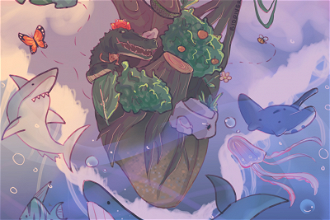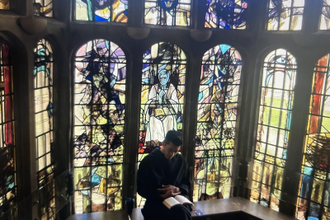Winning article in Columban School Biodiversity Matters competition

Austin Beenham
Austin Beenham, Holy Cross Catholic High School, Chorley, Lancashire, came first place in the 2024 Columban Schools Competition on the theme of 'Biodiversity Matters,' announced on 21 March. Jo Siedlecka of ICN was one of the judges.
The need to care for our Common Home
Biodiversity refers to the extensive variety of different species, helping the Earth to function. According to National Geographic Magazine there are 8.7 million species of plants, animals, and other life forms on the planet. When some of these species decline in number, ecosystems can become unstable as each species has its own unique role in contributing to the world that we live in. In the words of Pope Francis "all of us as living creatures are dependent on one another." God's creations provide us with food, materials and even purify the air that we breathe. Nevertheless, as we sit in our man-made homes there is a clear divide between us and nature and it is easy to feel separated from the natural world. Society should be more mindful of this quote from St Francis of Assisi: "All things of creation are children of the Father and thus brothers of man."
St Francis of Assisi's beliefs have shaped the church's views on stewardship and inspired the Pope so much that he chose the name 'Francis' as his title when he was voted in as Pope to honour the saint.
Pope Francis has also been instrumental in helping the church to act on the Climate Change and Biodiversity crises. The encyclical Laudato Si' has had a major impact on raising awareness of the need to protect our common home. One of the most important messages of this document was that, "all of us can cooperate as instruments of God for the care of creation, each according to his or her own culture, experience, involvements and talents." To me, this means that everyone, regardless of gender, race or background can work together to preserve God's creation.
However, it is not just Saints and leaders of the church that can take action on the biodiversity crisis - everyone can. But how? Previously, I thought that biodiversity was only an issue with exotic species on the other side of the planet and I felt helpless to do anything. Then I thought back to how our school made a difference to our viewpoint on the Climate Change crisis. We built a boat out of plastic bottles, raising awareness of how much plastic our school was wasting. It was a massively successful, in making many members of our school community reflect and there is now much more recycling at our school. Additionally, we tested the boat at a local reservoir and various local newspapers came to write articles and spread our environmental message.
What made our idea work? There were two things that come to mind. Firstly, we had worked as a community to construct the vessel, and we were able to do this in just 12 weeks, something that would have taken countless months by one person. To me, this emphasises how the Church as the body of Christ has the ability to make great change (There are well over 1 billion Catholics in the world today). Secondly, I realised that building a boat out of plastic bottles would prove how much we were wasting as a school, but it didn't magically solve the issue; we managed to reduce our waste by raising awareness. Understanding modern-day issues is so important because we all get so caught up in our own problems that we need a reminder that our actions can make a massive difference to the issues that we as a society face which may be detrimental to Earth's future if we do not act.
The same two principles apply to biodiversity. Although one person can make an impact, only a community can create lasting change. The problem is that most people don't know what biodiversity is or have misconceptions that they cannot do anything to help, like I did. This couldn't be further from the truth. According to the Natural History Museum, Britain only has 50.3% of its biodiversity left - the lowest in Europe and in the bottom 10% of countries throughout the world. Raising awareness enables everyone to see a clear picture of the scale of the biodiversity crisis and what they can do to help. But just knowing about the biodiversity crisis is not enough. We need to take action.
So here are some things that you can do that would make an extraordinary impact on preserving biodiversity. Firstly, we can encourage wildlife in our back gardens by providing food, water and shelter. Helping to clean up local habitats is also important to protect wildlife hotspots like forests and parks helping habitats to thrive. Shopping for good quality items that will last and have not harmed wildlife and food chains in production will not only help to preserve biodiversity but will save you money as well! You can spot this by looking for Rainforest Alliance certified and Forest Stewardship Council (FSC) products. Another contribution you can make to aid biodiversity is to take shorter showers and turn the water off when you are brushing your teeth. This helps species which rely on local freshwater by saving resources. Additionally, growing wildflowers which produce nectar for bees helps ecosystems. Finally, remembering to reduce, reuse and recycle prevents waste and tackles a destructive throwaway culture which has led to many habitats being destroyed and species being threatened due to landfill.
My message to all readers is: make some environmentally friendly changes, and remind people around you about the biodiversity crisis whilst raising awareness. By doing this you can make a positive chain reaction and become an example of how to live with respect and care for our world and all its inhabitants. If you do this, you will be a steward protecting our world, therefore you are caring for all of God's creation. "Let the heavens be glad, and let the earth rejoice; let the sea roar, and all that fills it; let the field exult and everything in it. Then shall all the trees of the forest sing for joy" (Psalm 96:11-12)
LINKS
Columban Competition: www.columbancompetition.com/


















